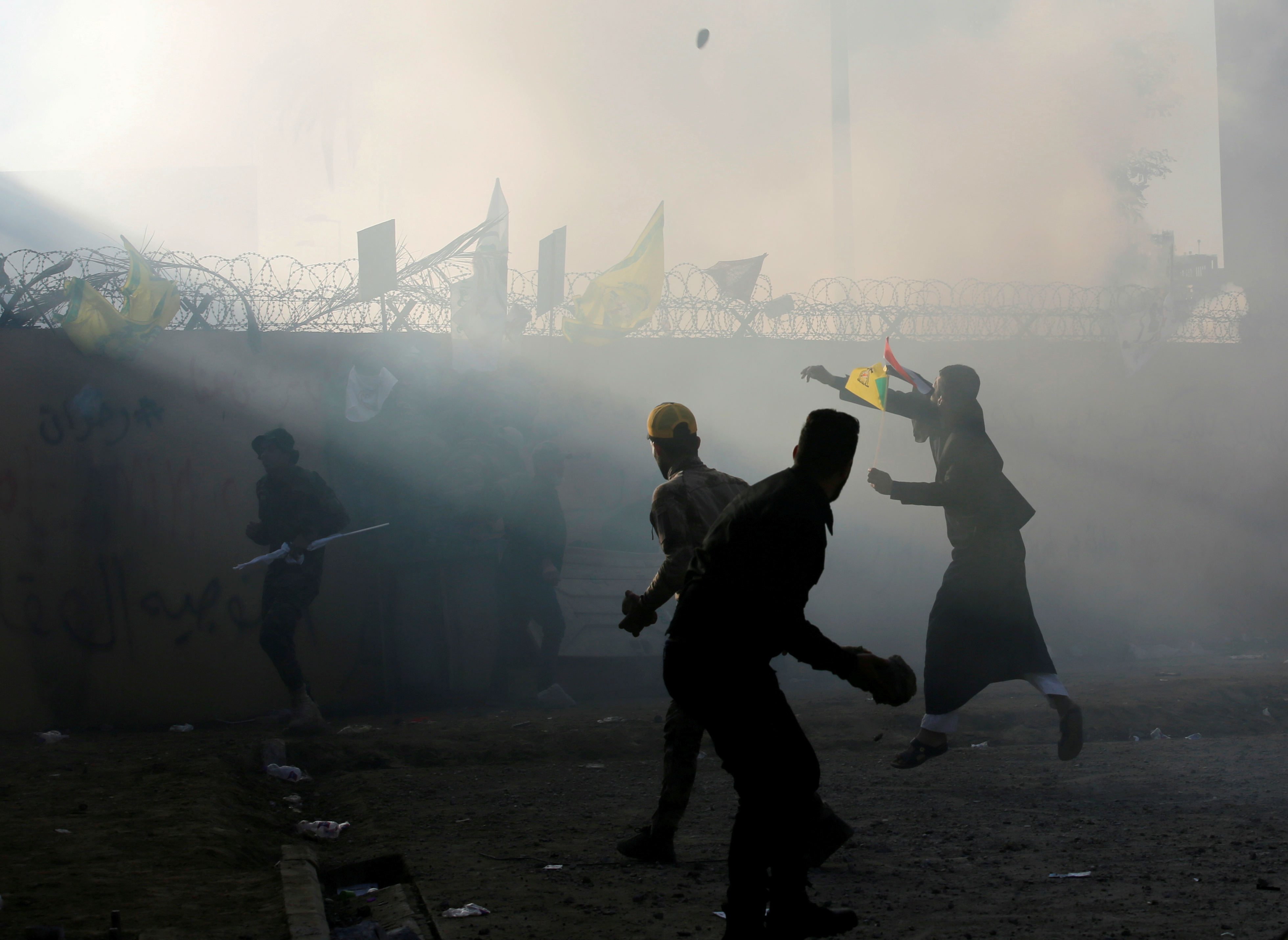EXCLUSIVE: US military offers Iraq a partial pullback
United States prepared 'in principle' to withdraw from some areas, though Anbar province's Ain al-Assad base is a 'red line'

Blast walls of a sleeping quarters for US soldiers are seen at Ain al-Asad air base in Anbar province (Reuters)
Published date: 14 February 2020 11:36 UTC |
The US military has offered senior Iraqi security officials plans for a partial pullback of troops from Iraq in response to January’s parliamentary vote calling for foreign forces to leave the country, Middle East Eye can reveal.
A meeting between the two sides, held in great secrecy last week, heard that Washington was prepared “in principle” to discuss withdrawal.
A representative of the US military told the Iraqis present that the United States was prepared to leave positions in or near Shia-majority areas, such as Balad Air Base, which is located 80km north of Baghdad and houses US trainers and contractors.
Washington, the Iraqis were told, could even consider reducing its presence in Baghdad.
'We are prepared to leave some of the Shia-majority areas, like the base in Balad. Maybe we could reduce our presence in Baghdad'- US military representative
“We are prepared to leave some of the Shia-majority areas, like the base in Balad. Maybe we could reduce our presence in Baghdad,” the military representative told his Iraqi counterparts, who understood from this that the US presence in the Iraqi capital would be reduced to guarding its embassy and the airport.
However, the US side categorically ruled out withdrawing from their biggest air base in Iraq, and the indeed the whole Middle East, Ain al-Assad.
The Anbar province base came under ballistic missile fire from Iran last month, in response to the US killing of the top Iranian commander, Major-General Qassem Soleimani, and Abu Mahdi al-Muhandis, the deputy head of the Hashd al-Shaabi paramilitary forces, at Baghdad airport.
For the US side, Ain al-Assad was its “red line”.
The representative said: “We cannot even start talking about withdrawing [from that base]. Withdrawal is out of the question.”
Such was the sensitivity of these discussions that they were held well away from Iraq. The meeting took place in the private residence of the Canadian ambassador to Jordan in Amman, Middle East Eye was told.
Present at the meeting was a representative of the US military, a Nato official and a senior Iraqi security adviser.
Shifting position
The private offer made to the Iraqis in Amman goes well beyond US Secretary of State Mike Pompeo’s last stated position a month ago.
Reacting to the flare-up between Washington and Tehran in Iraq, then-acting prime minister Adel Abdul Mahdi said both the US drone strike and retaliation by Iran violated Iraq’s sovereignty.
He demanded that Washington send a delegation to discuss the withdrawal of some 5,200 troops stationed in the country.
Rebuffing Abdul Mahdi, Pompeo said: “We are happy to continue the conversation with the Iraqis about what the right structure is.”
The US mission in Iraq was to train Iraqi forces to fight the Islamic State group (IS), he added, and “we’re going to continue that mission”.
“As times change and we get to a place where we can deliver up on what I believe and the president believes is our right structure, with fewer resources dedicated to that mission, we will do so,” Pompeo said.
Following the formal US handover to Iraqi forces in November 2011, ending the eight-year occupation, the United States’ military has relied on diplomatic notes inviting soldiers into the country and offering them immunity from prosecution.
The notes themselves, which were sent in 2014, have never been published.
January’s Iraqi parliamentary vote was advisory and non-binding, and the incoming prime minister, Mohammed Tawfiq Allawi, has yet to navigate his way around the issue. Allawi is supported by Tehran and influential Shia cleric Muqtada al-Sadr.
James Jeffrey, US special envoy to the coalition fighting IS, has insisted that the agreement to station US forces in Iraq was between Washington and the Baghdad government, not the parliament.
However, in frequent meetings between Jeffries and his Iraqi counterparts, the now departed Abdul Mahdi made clear to the US how vulnerable their forces were to the powerful Shia militia in the country.
US strikes last year on Kataeb Hezbollah, an Iran-backed militia, helped raise the temperature in Iraq and led to an assault on the US embassy in Baghdad and the killing of Soleimani and Muhandis.
Months before the US air strikes on Kataeb Hezbollah, Abdul Mahdi warned Washington of the possible consequences of such actions. His warnings were ignored.

The pressure on US forces to pull back remains intense.
“No one trusts the Americans any more. Not even [ex-Kurdistan regional president Massoud] Barzani, who said in one meeting he believed the Americans would turn their back on the Kurdish region and Iraq,” one Sunni party leader, who wished to remain anonymous, told MEE.
“My feeling is that the Americans will have to pull back, but they will not withdraw.”
The US State Department refused to comment on the Amman meeting. Sources said they would not comment on private diplomatic discussions.
A spokeswoman for Global Affairs Canada, the Canadian government department managing diplomatic and consular relations, also refused to comment on the meeting.


0 Comments:
Post a Comment
Subscribe to Post Comments [Atom]
<< Home